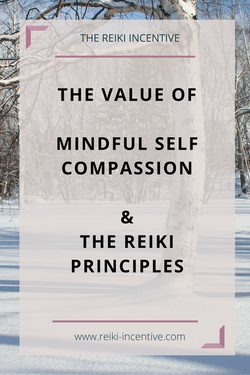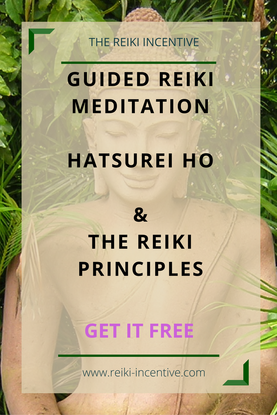
Anyone trained in Reiki will be familiar with the five Reiki precepts or principles. According to Reiki historian Don Beckett, the only piece of writing known to have been written by Mikao Usui is a scrap of paper which contains the Reiki principles, written in Japanese Kanji. They are the most important aspect of the reiki system. Many people who have received Reiki training in the past have simply been given a list of the Reiki principles with very little instruction or education with regards to their use and meaning. That was certainly true for me and many people I know who trained in Reiki, before seekers such as Dave King, Frank Arjava Petter and Chris Marsh went in search of the origins of Reiki in Japan. Deceptively simple and brief, the principles are both an overall description of the state of invited happiness and wellness that Reiki students sought, and also a list of individual instructions which when used and considered together form the way or the path towards peace, happiness, fulfillment and healing. They are the way of Usui, the mainstay of the system. Of course there are various different versions of the principles. This is because there are different possible translations of Japanese kanji. In addition, the interpretation of the princilpes will also depend greatly on the level of spiritual understanding of the translator. There is a deep and hidden meaning in them. A path to healing and ancient wisdom. There is no right or wrong with regards to which version of the principles you decide to use for your practice. The most important thing is that you consider them, and that your understanding of them grows with your practice. You may find that as your understanding of Reiki grows you switch from one version to another, or you might do away with the need for written versions altogether, recognising instead that they all describe different aspects of what are essentially the same principles. One working definition which sits well with me is as follows: The secret art of inviting happiness The miraculous medicine of all diseases: Just for today... Do not anger, Do not worry, Be grateful, Be honest (in your dealings with yourself and others), Be compassionate towards yourself and others In every morning and evening join your hand in prayer, pray these words to your heart and chant these works with your mouth. Usui Reiki Treatment for Improvement of body and mind. The Founder, Usui Mikao The secret, or hidden meaning behind the reiki principles is hinted at by the words "Just for today". Here Usui is inviting his students to be present, to be in the current moment. To reside with awareness in each moment as it passes, moment by moment. In other words to practice mindfulness. Mindfulness has become quite a buzz word in recent years, almost the “latest new thing” in both orthodox and complementary healthcare circles. That may be because people become very enthusiastic about it when they begin to uncover its potential. Techniques and skills associated with mindfulness can be found in many ancient religions and spiritual traditions, most notably Buddhism. A part pf ancient meditation techniques, mindfulness has historically been referred to in older texts using terms such as awareness, self awareness, being awake, watching the self and knowing the self. The term “mindfulness” was coined by Jon Kabat-Zinn who founded the Stress Reduction Clinic at the University of Massachusetts Medical School in the late 1970's. Jon has been intrumental in bringing meditation into western healthcare systems with his hugely effective and well researched Mindfulness Based Stress Reduction Programme. He states: "mindfulness means paying attention in a particular way; on purpose, in the present moment, and non judgmentally."
Whilst in a mindful state, Usui's students would reflect on, and also attempt to live by or embody Usui's five precepts.
Each precept is an individual guideline, whilst the precepts written together as a whole describe a way of being, a spiritual state of integrity where worry, anger, dishonesty, ingratitude and unkindness cannot exist. They describe a pathway to healing and happiness, each one integral to the other. This can only be understood when experienced. How do you work with the Reiki precepts? My preferred way is to perform the Japanese Reiki meditation Hatsurei Ho mindfully and during this, when calm and aware, I recite and consider the precepts, perhaps sometimes reflecting on how each one applies to me and what I am experiencing each day. This is the way the principles are considered in Japan, in the Usui Reiki Ryoho Gakkai. The Hatsurei Ho meditation brings together, and adds to two of the meditative energy exercises that Usui was known to teach his students at first degree. You can download a free mp3 version of my guided Hatsurei Ho and Reiki principle meditation here, or at the end of this article. Self-compassion, the fifth principle Self-compassion and the practice of mindfulness are interlinked, overlapping practices. It is important to be compassionate towards oneself in order to practice mindfulness meditation. A key element of the practice is to be aware of our thoughts, non-judgementally. It is hard to do this without an element of self-compassion. Similarly, we cannot truly be compassionate towards ourselves if we don't also have a mindful awareness of the emotional or physical stress or distress we may be suffering. Self compassion involves treating yourself with the same care, kindness, gentleness, sympathy and compassion as you would give to a loved friend. It is more common however for us to treat ourselves with criticism and harsh judgement. We can damn ourselves for our imperfections rather than recognising that to be imperfect is human and is something we share with every other human being on this planet. Mindful self-compassion helps us to develop emotional resilience and well-being. We become aware of any negative emotions and then neither suppress them or ruminate on them. If we just let them be with kindness and soften our resistance to them then they can trouble us so much less. Studies have shown that mindful self-compassion can make us more positive in our relationships. It can enhance our motivation and can support us in taking positive directions in life, whether they be a new health routine or a new career. It gives us a safety net where we accept and acknowledge our weaknesses and positively work around them or change them constructively and without criticism. We don't become as stressed and frustrated when we can't or don't meet our goals. We become less afraid of failure and more likely to pick ourselves up and try a new direction, all of which can lead us to a more fulfilling life. It enhances both our physical and emotional well-being. It is becoming more and more understood that mindfulness and self-compassion affect how we react, respond and relate to emotional distress. Clinical research has shown that those who lack awareness of their suffering and distress and who lack self-compassion are often those who come off the worst when going through anything stressful or traumatic. So don't neglect the Reiki principles. As part of our work with Reiki we benefit not only from treatments and self-treatments, but also from meditation and working with the precepts. This is the work which takes us on our own healing journey towards a greater state of awareness, stillness and wholeness. It enhances our ability to be with and to treat others. As Reiki teachers, it helps us to guide our students along the same path. But it is not an easy journey. It is a journey of commitment. Commitment to the mastery of reiki and mastery of ourselves. You can explore this more deeply in my guided Hatsurei Ho and Reiki Principle meditation which you can download by clicking the image below.
If you are interested in learning more about mindfulness meditation there is an excellent FREE course available here.
I would like to acknowledge Dr Kristin Neff whose extensive work on the development of mindful self compassion practices and the clinical research she has done looking at the effectiveness of them has greatly informed this article. There are several excellent guided self compassion meditations available on her website. Sources: Dahm, K., Meyer, E. C., Neff, K. D., Kimbrel, N. A., Gulliver, S. B., & Morissette, S. B (2015). Mindfulness, self-compassion, posttraumatic stress disorder symptoms, and functional disability in U.S. Iraq and Afghanistan war veterans. Journal of Traumatic Stress, (ahead-of-print), 1-5. Albertson, E. R., Neff, K. D., & Dill-Shackleford, K. E. (2014). Self-Compassion and Body Dissatisfaction in Women: A Randomized Controlled Trial of a Brief Meditation Intervention. Mindfulness, 1-11. Neff, K.D. & Dahm, K. (2014) Self Compassion: What it is, What it does and how it relates to mindfulness (pp. 121 – 140). In: Robinson, B. Meier & B. Ostafin (Eds.) Mindfulness and Self-Regulation. New York: Springer. Neff, K.D. & Tirch,D. (2013) Self Compassion and ACT. In T. B. Kashdan, J. Ciarrochi (Eds.) , Mindfulness, acceptance, and positive psychology: The seven foundations of well-being (pp. 78-106). Oakland, CA US: Context Press/New Harbinger Publications.
3 Comments
Eric Zimmerman
5/10/2018 01:39:07 pm
No doubt, self-compassion is the new mindfulness. And the ultimate truth is, there is a strong connection between benevolence and well-being. When you feel vulnerable, your benevolence will help you in overcoming that extremity. In other words, I can say that it is the best antidote to shame and self-depreciation. Initially, it may seem like self-indulgence. But actually, it is not. With regulating your introspection, and without deleting your curbing postulations, you can't be mindful. Thus, first, you need to take the necessary measures for being mindful, which will ultimately help you in making a more compassionate individual who can spot the motivating force in his every day life- http://www.reginafasold.com/blog/how-to-find-inspiration-in-your-everyday-life/ .
Reply
8/7/2018 06:41:43 am
It's great to know that this kind of treatment will be able to open your mind without being judgemental to your own thinking. I guess my sister would benefit from this kind of healing because I noticed how low she thinks of her self. She would usually be insecure about a lot of things especially whenever she and my father are having a fight.
Reply
Leave a Reply. |
Author
Angela established the Reiki Incentive for Reiki practitioners who want to see Reiki more widely accepted and to see it reach new people. She enjoys sharing her passion for authentic practice as well as research into the benefits of this wonderful therapy. Archives
May 2018
Categories
All
|


 RSS Feed
RSS Feed
